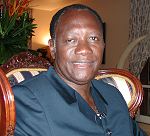Saturday, 1 January 2011
 Image via Wikipedia
Image via WikipediaThe Foreign Secretary added: "We are a long way here from discussing British forces being deployed." But he said a UN sanctioned armed intervention might be the only realistic option to ensure that Mr Gbagbo steps aside for Alassane Ouattara, who is regarded by the international community as having won recent national elections in the West African state.
Asked on BBC Radio 4's Today programme if the UK would support such action, Mr Hague replied: "Yes, in principle. They would be well advised to seek the authority of the United Nations to do that and we would be supportive of that at the UN. We are a long way here from discussing British forces being deployed. We have deployed a military liaison officer to the country to work on various contingencies with the French, but I'm not raising the possibility today of British forces being deployed."
The Foreign Office later announced that Britain no longer recognised Philippe Djangone-Bi, Mr Gbagbo's ambassador, as Ivory Coast's representative, and would seek "to recognise the appointee of President Alassane Ouattara in the usual manner".
The early days of Tony Blair's premiership were marked by "wars of liberal intervention", of which Sierra Leone, another West African country, became the most potent symbol. Similar interventions took place in East Timor and on a larger scale in Kosovo. Mr Blair remains a hero to many in these places, but critics hold that these conflicts paved the way to the UK's involvement in the US-led invasion of Iraq.
With a force of more than 9,000 deployed in Afghanistan there is unlikely to be any appetite for the Cameron government dispatching troops to Ivory Coast. The French may be part of an international mission in their former colony.
The bulk of such a force, however, is expected to consist of troops from neighbouring countries which have warned Mr Gbagbo that they will step in unless he stands down.
Ivory Coast's official bank accounts overseas have been frozen and Mr Hague said: "He [Mr Gbagbo] will run out of money. His power relies on control of the army. He will run out of money in the next few weeks and that means his power will come to an end.
"He should not underestimate the determination of the international community that the will of the people of that country should be recognised.



No comments:
Post a Comment